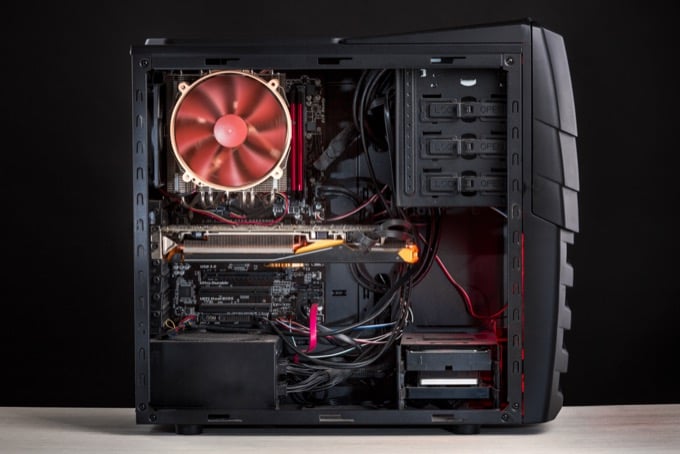If you want to get into PC gaming, you’ll have to choose whether you want to buy a gaming laptop or a gaming desktop PC. Since it’s a long-term financial commitment, you may want to consider the pros and cons of owning a gaming laptop versus a gaming desktop.
Note: This article is written considering normal times in terms of pricing and availability. The prices of desktop computer components can be affected by silicon shortages, making them more expensive or less available than comparable laptops. In that case, you should adjust your reasoning to take that into account.
Differences Between a Gaming Laptop and Gaming Desktop
The most significant difference between a gaming laptop and a gaming desktop is that a gaming laptop is a complete system that includes all peripherals. The manufacturer decides what screen, keyboard, GPU, CPU, and other components you get in their product. Apart from perhaps the RAM and SSDs, you’re stuck with the given specifications of a gaming laptop and can’t customize it to your exact needs as you can with a desktop computer.
However, what you get in return is a portable gaming machine that you can play in bed, hook up to your TV like a console, and take with you wherever you travel.
Price vs. Performance
Historically, gaming laptops were poor value for money as they:
- Had CPUs and GPUs one generation behind their desktop counterparts
- Offered poor gaming performance
- Were more expensive than gaming desktop computers
Today things are very different. Since the release of the Nvidia RTX 20 series and 30 series of graphics cards, gaming laptops have closed the performance gap.
In terms of price, gaming laptops are still more expensive from a price to performance perspective, but in general, the premium you’ll pay isn’t outlandish.
A Balanced System
One notable advantage is that makers of gaming laptops carefully think about which sort of gamer and what types of games a given device caters to. Most gaming laptops:
- Have a CPU or GPU that is well-balanced for one another
- Have motherboards specifically designed to work with other hardware in the system
- Are closer to the fixed hardware design of gaming consoles than desktop PCs
Building your own perfectly balanced desktop system is great, but practically speaking, pre-built desktops and most hand-built systems tend to have performance bottlenecks somewhere. In our experience, this is something gaming laptop makers are less likely to do.
The Plug & Play Laptop Experience
Apart from carefully pairing well-matched components, gaming laptop makers:
- Have a unique opportunity to control the software environment of their systems.
- Create and issue the software image (usually Windows).
- Provide custom versions of system drivers.
If something goes wrong with your gaming laptop’s software, it’s usually not a big issue since you can simply reset to the factory image.
Limited Upgradability
One area where gaming laptops have a disadvantage is upgradability. In general, the only components you can upgrade in a laptop are the hard drive and RAM.
- Some laptops use what’s known as an “MXM” module for their graphics chips. The laptop maker can later sell you a new MXM module with an upgraded GPU. While MXM modules aren’t cheap compared to the cost of a standard desktop GPU of the same type, it’s still a lot cheaper than a whole new laptop.
- MXM systems are rare however, but a more common feature is support for external GPUs. Laptops equipped with Thunderbolt 3.0 may also support eGPUs. You can buy an external enclosure and use any desktop GPU supported by that enclosure. Although this will limit you to plugged-in desktop play, it’s an excellent solution for gaming on the go with the internal hardware and docking at home for high-end experiences.
Note: Most desktop PC gamers don’t upgrade major components of their systems often, and the life of a modern gaming PC should compare to that of a current console cycle, at least when it comes to cross-platform titles.
The Desktop Dream
While gaming laptops are a viable choice for PC gamers these days, desktop systems are still the gold standard. PC gaming enthusiasts take pride in choosing every component that goes into their system and its appearance. They also like their system to perform exactly as they want.
Gaming desktops allow for much more flexible budgeting. While you need to pay almost the entire amount for a gaming laptop up front, you can spread the cost of upgrading a gaming desktop out over time.
This level of custom design and flexibility can be very appealing. Still, the popularity of bulky desktop systems is waning in the face of devices like the Razer Blade 15 and Asus ROG Zephyrus G15. These are devices with more gaming performance than most users need, a compact package, and a price that’s not entirely unreasonable.
source https://www.online-tech-tips.com/gaming/gaming-laptop-vs-gaming-desktop-pros-and-cons/





